MIT SCHOOL OF HUMANITIES, ARTS, AND SOCIAL SCIENCES
Media + Awards Digest | July 2020
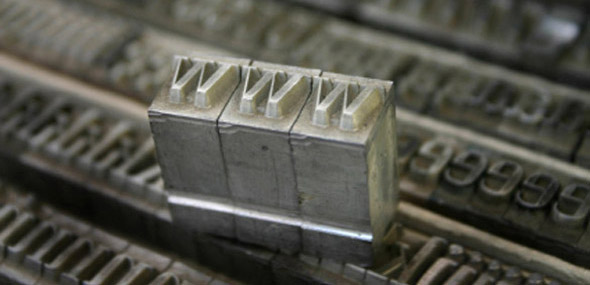
The Media + Awards Digest is a section of the Said and Done newsletter. Subscribe
Office of the Dean | 9 July 2020
Dear Friends,
Our nation continues to struggle with coronavirus, systemic racism, and political polarization, yet bright spots emerge. The result of a tremendous effort across the Institute and beyond, we now have a clearer sense of the fall semester. I hope this provides some relief and stability as we move forward.
Our School continues to make significant contributions to the public understanding and analysis of ways to address the current crises, including media engagements on the pandemic and racism, as well as political and foreign policy developments.
Security Studies Program Director Taylor Fravel helps illuminate the India-China clash with interviews in The Wall Street Journal and The Guardian. Political scientist Vipin Narang also weighs in with expertise on the region, discussing North Korea with The New York Times.
In a powerful Boston Globe op-ed, political science alumna Netia McCray '14 provides a personal view of being Black in America. CMS/W Professor Lisa Parks helped organize a letter calling for news organizations to hire more Black employees. More than 320 scholars and practitioners signed the letter, and the effort was covered by The Los Angeles Times.
On the economics front, Institute Professor Daron Acemoglu was interviewed about his recent research on workplace robots and automation by The New York Times and Forbes, and published a sobering analysis of American institutions in Foreign Affairs. Economist David Autor continues the discussion of Covid19 as “an automation-forcing event.” Charles Stewart III provides expertise on mail-in voting in an interview with CBS News, as well as co-authoring an opinion piece in The Atlantic.
Finally, MTA Professor Sara Brown’s ingenious theatrical design for social distancing is featured in The New York Times; CMS/W Professor Tom Levenson eyes restaurant reopenings warilyl and STS Professor Sherry Turkle offers a droll view on video calling ironies.
I hope each of you will find time to enjoy the summer season. With thanks for all you do,
Very best wishes,
Melissa
Melissa Nobles
Kenan Sahin Dean
Professor of Political Science
MIT School of Humanities, Arts, and Social Sciences
HONORS AND AWARDS
ECONOMICS
Stephen Morris named the inaugural Peter A. Diamond Professor of Economics
MIT Department of Economics establishes new professorship honoring Institute Professor and Nobel laureate. The professorship was made possible by a generous gift from Economics alumnus C.C. Chen, PhD ‘67, the founder and group chairman of Wan Hai Lines. Morris, who joined the MIT faculty in 2019, is an economic theorist who has made trail-blazing contributions to the foundations of game theory and mechanism design and in the application of global games to problems in macroeconomics and finance. Story
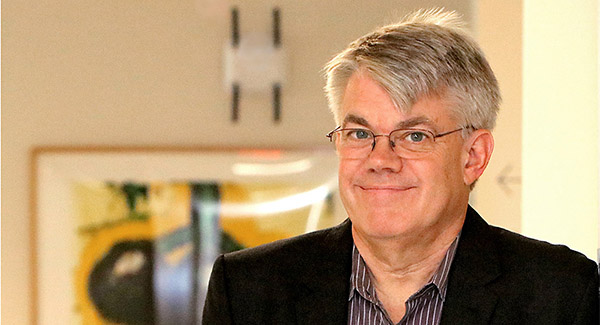
Stephen Morris, MIT Department of Economics
"Peter Diamond is one of my intellectual heroes. His research laid the foundations of an MIT tradition of studying economic theory with tight connections to applied fields. I have always admired this tradition, and since my move to MIT, I have had the pleasure of confirming that it is alive and thriving."
— Stephen Morris, Peter A. Diamond Professor of Economic
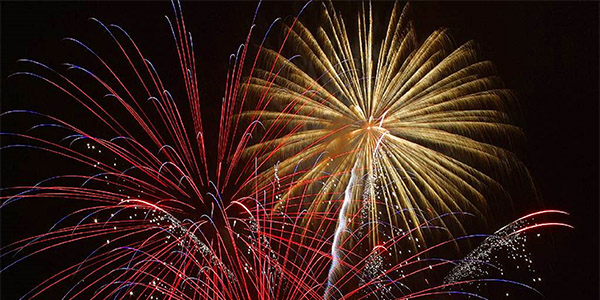
MIT SHASS
Infinite Mile Awards 2020
Melissa Nobles, Kenan Sahin Dean of the School of Humanities, Arts, and Social Sciences, has announced the six winners of the 2020 MIT SHASS Infinite Mile Awards. The awards salute members of the SHASS staff who have made exceptional contributions to their academic units, the School, and the Institute.
Warmest congratulations to the 2020 recipients!
GLOBAL LANGUAGES/HISTORY
Paris and the Cliché of History wins prestigious Laurence Wylie Prize | Catherine Clark
Selected from a pool of over fifty nominated books, Paris and the Cliché of History explores how the history of photography and the history of Paris in the popular imagination became deeply intertwined. The Laurence Wylie Prize in French Cultural Studies is awarded every second year to an outstanding book in French social or cultural studies concerning any historical period.
Announcement from NYU Institute of French Studies
ECONOMICS
Daron Acemoglu and others honored as Committed to Caring
Institute Professor Acemoglu is among twelve faculty honored as “Committed to Caring” for 2020-2021: The honor recognizes faculty mentors who "tend to personalize their advising styles to the individual student; work collaboratively with students to navigate difficulties; and empower students to guide their own research agendas."
Story at MIT News
SCIENCE, TECHNOLOGY, AND SOCIETY
Eden Medina selected as 2020-21 Radcliffe Fellow
Medina will pursue an individual project in a community dedicated to exploration and inquiry. Her project, Bones and Lives: Making and Unmaking Truth after Dictatorship, investigates the history of Chile’s transition to democracy from the perspective of science and technology.
2020-21 Radcliffe Fellows | Announcement on Medina's webpage
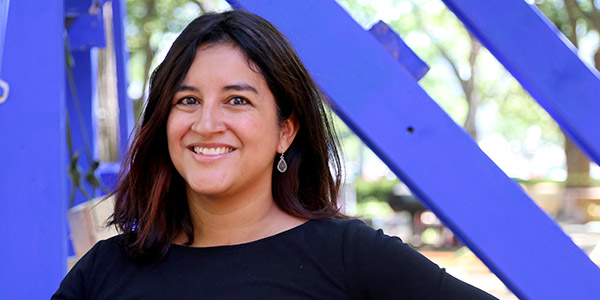
Eden Medina, MIT Associate Professor of Science, Technology, and Society; photo by Allegra Boverman
MEDIA DIGEST
MAKING A JUST SOCIETY
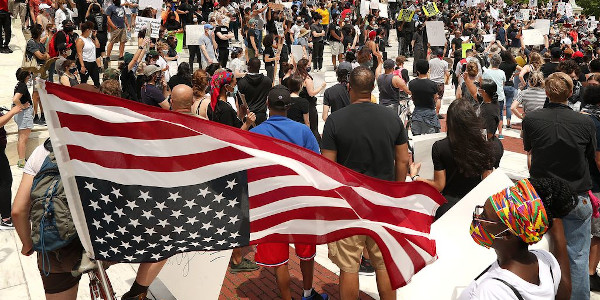
In Providence, thousands protested the killing of George Floyd; photo by John Tlumacki/Boston Globe
THE BOSTON GLOBE
The impossible burden of being Black in America | Netia A. McCray '14
McCray, SB '14, Political Science, writes, "While this may be non-Black America’s first time realizing the burden they have placed on Black Americans, it's also the first time Black Americans have realized what life could be like not shouldering that burden." McCray is the founder of Mbadika, a Boston-based nonprofit that helps kids get the technology skills they need to succeed in the modern economy.
Commentary at The Boston Globe | McCray and MISTI | Profile of Mbadika | Mbadika website
THE LOS ANGELES TIMES
Academics call on news execs to hire more Black employees | Lisa Parks
More than 320 scholars and practitioners in media and communications signed a letter sent to six CEOs of television news networks, including NBC, CBS, ABC, CNN and PBS, calling out issues of systemic racism within the organizations. The letter, copied to commissioners with the Federal Communications Commission, was started by Professors Anna Everett, UC/Santa Barbara, and Lisa Parks, Comparative Media Studies at MIT.
Story at The Los Angeles Times
ECONOMICS

Image via Getty Images
FORBES
Why deep investment in automation results in more jobs | Daron Acemoglu
New research from MIT suggests the key to the impact of robots on employment is the speed of their deployment. The study suggests that when companies add robots quickly, they also tend to add human workers to their payroll too. When companies are less enthusiastic in their investment in technology, it tends to coincide with job losses.
Story at Forbes
THE NEW YORK TIMES
Why do we pay so many people so little money? | Daron Acemoglu
Some of the more obvious solutions pose the danger of creating unanticipated, adverse incentives, according to Acemoglu: "Raising the minimum wage and protecting these workers by safety regulations and by increasing their bargaining power would help some, but is not a comprehensive solution."
Story at The New York Times
FOREIGN AFFAIRS
America’s democratic unraveling | Daron Acemoglu
Countries fail the same way businesses do, gradually and then suddenly. “The next administration must confront endemic racism as well as economic inequality,” writes Institute Professor Daron Acemoglu of how to address the unraveling of U.S. institutions.
Story at Foreign Affairs
POLITICAL SCIENCE / SECURITY STUDIES 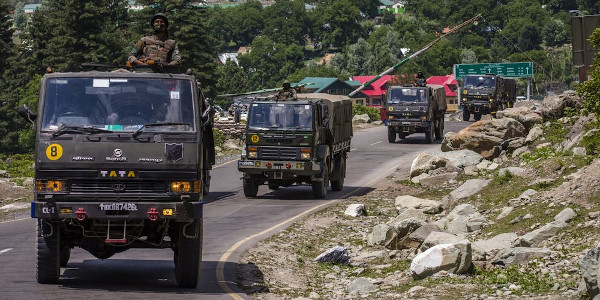
An Indian army convoy on a highway bordering China; photo by Yawar Nazir/Getty Images
WBUR
North Korea blows up joint liaison office with South | Jim Walsh
The dramatic display of anger sharply raises tensions on the Korean Peninsula, and puts pressure on Washington and Seoul amid deadlocked nuclear diplomacy. Host Robin Young speaks with Here & Now security analyst Walsh.
Conversation at WBUR | Walsh webpage
THE WALL STREET JOURNAL
India-China border clash shows Beijing’s territorial push | Taylor Fravel
The use of such forceful tactics “reflects a continuity in China’s approach under Xi and not a departure,” said Fravel. “Whether it marks an inflection point in China’s foreign policy and a willingness to use force in territorial disputes depends on what happens in the next few days and weeks.”
Story at The Wall Street Journal
BLOOMBERG
Modi says China isn’t occupying Indian territory after clash | Vipin Narang
“The biggest implication is that wherever the Chinese have in fact changed the ground status quo—whether in Galwan Valley or Pangong Tso or elsewhere—is tacitly being accepted by the government as de facto Chinese claims,” said Narang. “One can litigate whether this is in fact ‘Indian territory,’ but it is tacitly accepting whatever faits accomplis China has undertaken.”
Story at Bloomberg
THE GUARDIAN
Can China afford to make an enemy of India? | Taylor Fravel
“I feel it’s generally a response to the pressure Xi feels he is under,” said Fravel. “Because of Covid and the criticism China faced internationally, the economic crisis at home, and the concomitant deterioration of China-US relations, [Beijing] has taken a tough stance on a number of sovereignty issues as a way of signalling that China will not be cowed.”
Story at The Guardian
THE NEW YORK TIMES
China’s military provokes its neighbors; the message is for the U.S. | Taylor Fravel
“When China views it is being challenged in these other sovereignty disputes in this era, it will respond with a very tough line,” Fravel said. “China never had the ability to assert itself in the maritime domain until really in the last 10 or 15 years,”
Story at The New York Times
THE NEW YORK TIMES
Two years later, little to show for personal diplomacy | Vipin Narang
“Trump has told himself this was a win, and so has Kim,” said Narang. “Trump keeps repeating, ‘There wasn't a war.'...For Kim Jong-un it was also a win because he is able to take the air out of the maximum pressure campaign.”
Story at The New York Times
POLITICAL SCIENCE
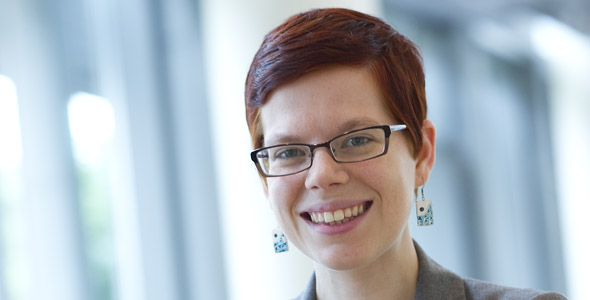
Ariel White; photo by Stuart Darsch
THE BOSTON GLOBE
Defund the police makes some Democrats uncomfortable. | Ariel White
White compared activists calling for dramatic changes to those fighting for gay rights in previous decades. “Public opinion was not on their side and yet people had a very clear vision that they ultimately pulled the public along with.”
Story at The Boston Globe
THE ATLANTIC
The looming threat to voting in person | Charles Stewart III
Stewart underscores the importance of developing strategies that allow Americans to safely vote in-person for the forthcoming presidential election: "The current trajectory in many states suggests that the demand for in-person voting will hugely outstrip the supply of poll workers and polling places. This imbalance erects barriers to voter participation and needlessly jeopardizes the health of poll workers and voters."
Opinion at The Atlantic
CBS
Election experts explain why mail-in voting is secure and honest | Charles Stewart III
Comments by Trump and Barr have baffled election officials and experts who say a complicated and detailed set of safeguards in place are expressly designed to detect and prevent fraud and interference. "You would have to reproduce the entire election administration apparatus somewhere in the middle of Siberia," says Stewart.
Story at CBS
PANDEMIC-RELATED MEDIA PUBLICATIONS
At-A-Glance List of Pandemic-related Media Publications from MIT SHASS
An ongoing list of commentaries from our School community to inform policy and to increase public understanding of the pandemic.
Collected Publications
THE ARTS & DAILY LIFE

Sara Brown's model for the Wilma Theater’s seating structure, based on Shakespeare’s Globe Theater
THE NEW YORK TIMES
Theater plans dividers to keep patrons socially distanced | Sara Brown
Brown is collaborating with the Wilma Theater in Philadelphia, referencing Shakespeare’s Globe Theater to develop solutions for the theater to reopen safely.
Story at The New York Times
THE GUARDIAN
"We didn't meet in person until shoot day" | Sherry Turkle
"Turkle talked about one of the ironies of video calling. This technology, which is meant to connect us, has a catch. In order to produce the effect of looking into someone's eyes on a video call, you need to look away from their eyes."
Story at The Guardian
THE BOSTON GLOBE
Citizens eye reopening restaurants warily | Tom Levenson
“We know from examples in other countries that the enclosed space of a restaurant — particularly in hot weather, where there is air conditioning going — is a perfectly great place to recirculate air and hence recirculate virus,” said Levenson, author and professor of science writing at MIT.
Story at The Boston Globe
All Arts-Related Pandemic entries | All Daily Life Pandemic entries
2020 ELECTION
THE ATLANTIC
The looming threat to voting in person | Charles Stewart III
Stewart underscores the importance of developing strategies that allow Americans to safely vote in-person for the forthcoming presidential election: "The current trajectory in many states suggests that the demand for in-person voting will hugely outstrip the supply of poll workers and polling places. This imbalance erects barriers to voter participation and needlessly jeopardizes the health of poll workers and voters."
Opinion at The Atlantic
CBS
Election experts explain why mail-in voting is secure and honest | Charles Stewart
Comments by Trump and Barr have baffled election officials and experts who say a complicated and detailed set of safeguards in place are expressly designed to detect and prevent fraud and interference. "You would have to reproduce the entire election administration apparatus somewhere in the middle of Siberia," says Stewart.
Story at CBS
All Election-related Pandemic entries
ECONOMIC MATTERS
THE ECONOMIST
Kai-Fu Lee on how Covid-19 spurs China’s great robotic leap forward | David Autor
"Robots don’t get sick. They don’t strike. They don’t demand higher wages for dangerous jobs. In fact, they are ideal for dangerous jobs, which in a pandemic is any job that requires interaction with people. It is no wonder that David Autor, an economist at MIT, calls the covid-19 pandemic and economic crisis 'an automation-forcing event.'"
Conversation at The Economist
PBS
What the government should learn from this pandemic | Peter Temin
Now, as states are reopening, the economy is adding back some jobs, but the effects of the pandemic and the recession it plunged the country into will likely be felt for years, said Temin.
Commentary at PBS
BOSTON PUBLIC RADIO
Health care options for people who've lost coverage | Jon Gruber
Gruber discussed health care options for people who've lost coverage after losing their jobs, and responded to questions from callers.
Full episode at Boston Public Radio
All Civic Perspectives Pandemic entries
The Media + Awards Digest is a section
of Said and Done, the School's online digest.
EXPLORE
Follow us




Subscribe to Said and Done
10 issues a year
Making a Better World
Basic Research | Citizenship | Computing and AI | Education
Health of the Planet | Human Health | The Human Factor
Arts Innovation | Social Innovation
Perspectives for the Pandemic
Explore the Series
Making a Just Society
Explore the Resources
Solving Climate
Browse the Series
Ethics, Computing, and AI
Browse the Series
Computing and AI: Humanistic Perspectives from MIT
Browse the Series
MIT Climate website
A major source of research, innovation, and discussion
Join us!
SHASS on MIT News
Research and Features
MIT Campaign for a Better World
Story | Join Us

Published by SHASS Communications
Office of the Dean, MIT School of Humanities, Arts, and Social Sciences
Editor and Designer: Emily Hiestand
Publication Associate: Alison Lanier
Media Relations Manager: Stephen Oakes
Published 8 July 2020